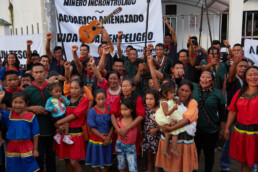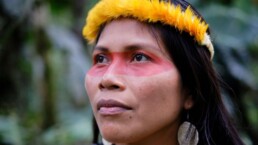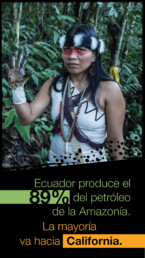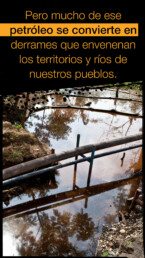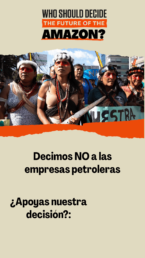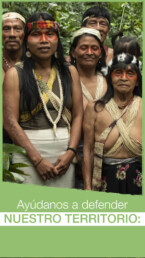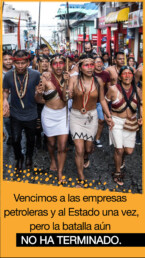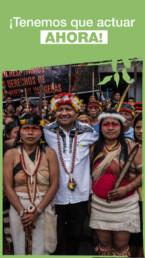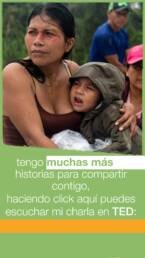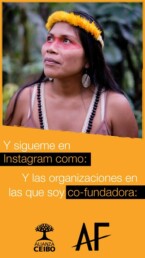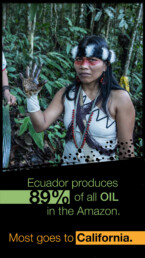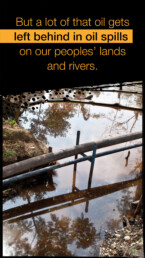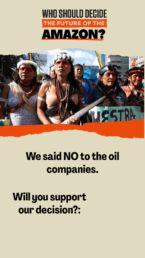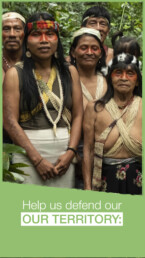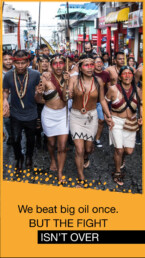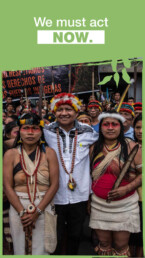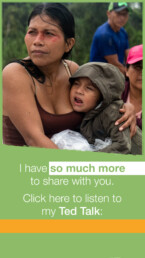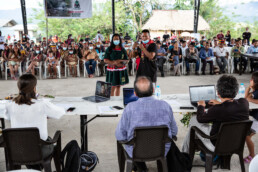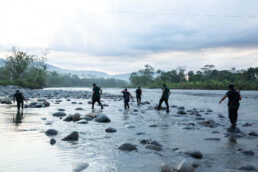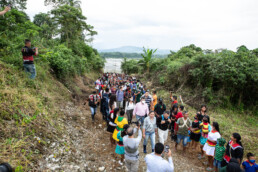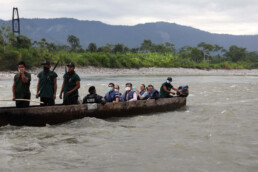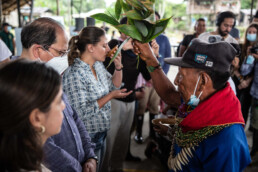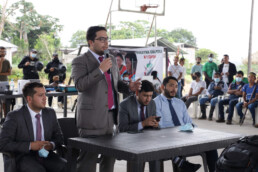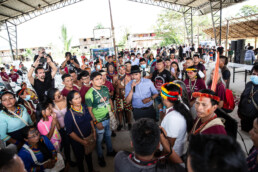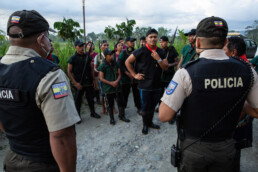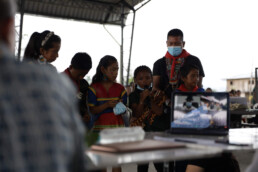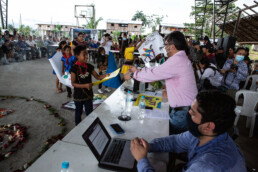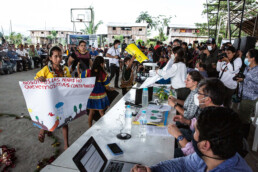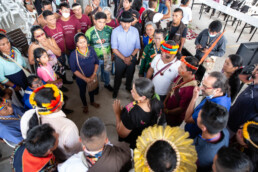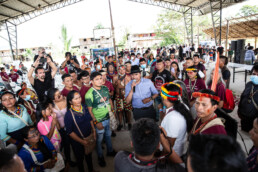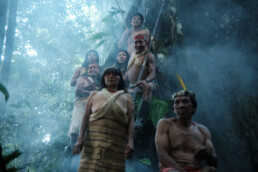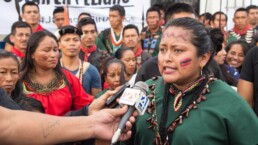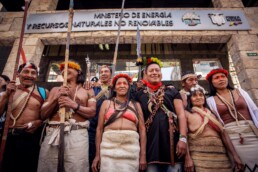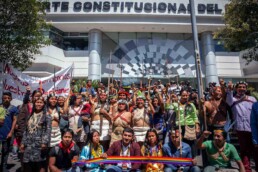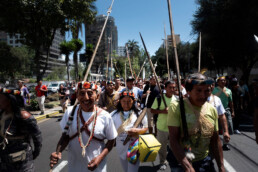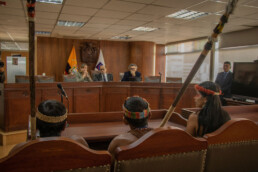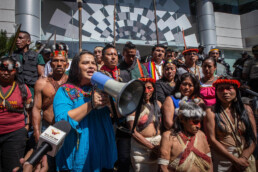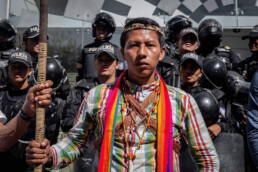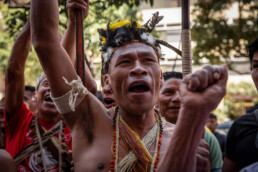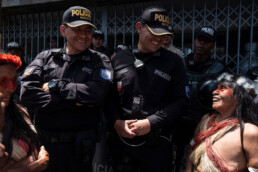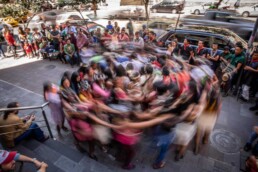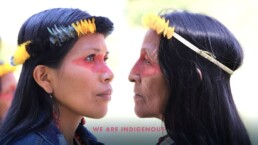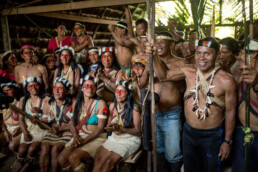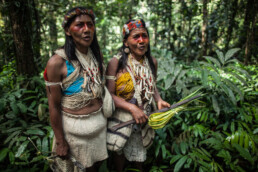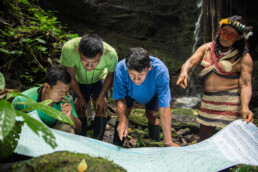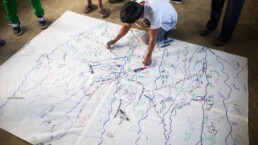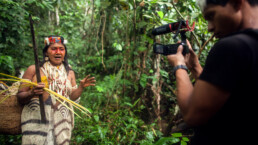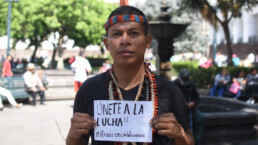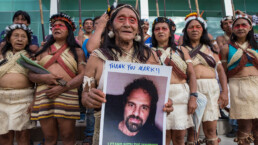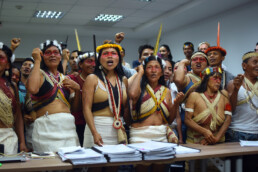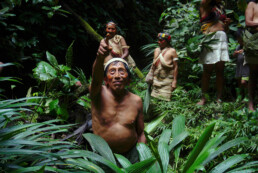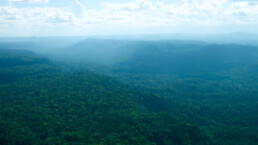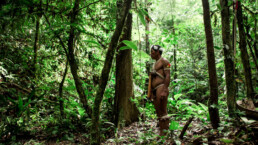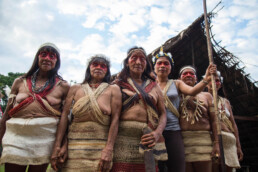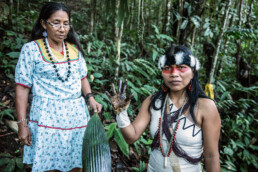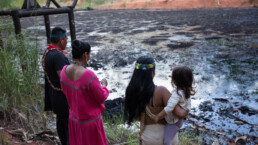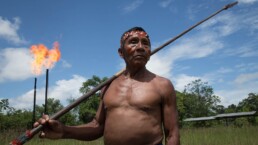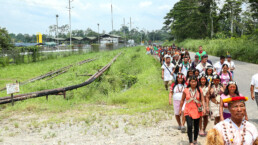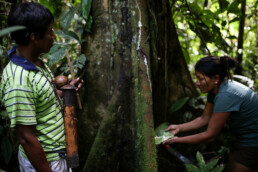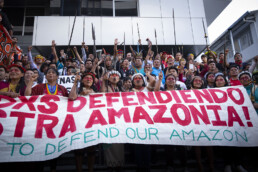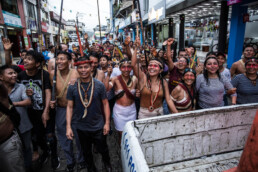Ecuador’s Supreme Court Makes Historic Ruling Recognizing Indigenous Right to Consent Over Oil and Mining Projects
For more information, contact:
Kelsey Flitter at +1.215.680.6191; Kelsey@amazonfrontlines.org
Photos, video and spokespeople available upon request.
Quito, Ecuador, February 4, 2022 – Today, the Constitutional (Supreme) Court of Ecuador, the country’s most powerful judicial body, published a ruling recognizing, for the first time, the right of indigenous communities to have the final decision over oil, mining and other extractive projects that affect their lands. Ecuador now has one of the most powerful legal precedents in the world on the internationally recognized right of Indigenous peoples to Free, Prior and Informed Consent, a powerful legal tool for Indigenous survival and the protection of huge swaths of forests and mega-biodiverse ecosystems.
The ruling stems from the A’i Kofán community of Sinangoe’s 2018 lawsuit that annulled 52 gold-mining concessions granted by the government along their most important river. Sinangoe hosted the Court’s first ever hearing in Indigenous territory in the heart of the Amazon on November 15th, 2021. Today’s decision signals that the nation’s highest court backs the right of all Indigenous peoples to have the final say over extractive projects that may affect over 23 million acres of Indigenous lands and forests nationwide.
The ruling highlights the need for the State to obtain the consent of the affected communities before undertaking oil, mining or other extractive plans or projects, based on Indigenous peoples’ right to self-determination. The Judges cite ex-United Nations Special Rapporteur on the Rights of Indigenous Peoples James Anaya to explain: “A direct or considerable effect in the lives or territories of Indigenous peoples establishes a solid presumption that the proposed measure should not be adopted without the consent of the Indigenous Peoples. In determined contexts, that presumption can convert into a prohibition of the measure or project if consent of Indigenous peoples does not exist.”
Coming only two months after the COP 26 meeting in Glasgow, where governments, including Ecuador, recognized the crucial role indigenous communities play in meeting the world’s forests, climate and biodiversity goals, today’s victory and Sinangoe’s years-long battle against gold-mining is an example of the type of frontlines Indigenous-led climate action needed in order to meet those goals and stave off a global climate crisis. Indigenous territories worldwide cover an estimated 22% of the Earth’s surface, safeguard 80% of the world’s biodiversity and hold at least 17% of all forest-stored carbon.
“This is a very important ruling for our community and others that face similar problems. After a long road of struggle and resistance, we were anxiously awaiting the favorable outcome from the Court. This decision is an enormous victory for Sinangoe and to now have a legal instrument that guarantees the rights to our communities, where there needs to be a historical precedent of free, prior and informed consent within the national territory, demonstrates the power of unity. We demand, as ancestral people, in our territories that our constitutional rights be respected, guaranteed and fulfilled,” says Wider Waramag, a leader with the A’i Kofán community of Sinangoe.
The Court’s decision deals a major blow to President Guillermo Lasso’s plans to ramp up resource extraction throughout the Amazon as part of their COVID recovery economic plans, as Indigenous lands cover 70% of the mineral-rich Ecuadorian Amazon. The recent major pipeline ruptures in April 2020 and January 2022 that spewed toxic oil into Amazonian watersheds in Indigenous Kichwa territory highlighted the dangers of oil production in the Amazon, and the potential shift of decision-making power now that future pipelines will require Indigenous consent to proceed. The Court underlines that the right to consent must be applied even if “the plans or projects pursue the satisfaction of legitimate ends in a democratic society”, a clear nod to government discourse around the need to drill or mine for the greater good of the national economy. In July 2021, President Lasso issued Executive Decree 95 that seeks to double oil production to reach 1 million barrels per day (bpd), and Executive Decree 151 that looks to expand the mining industry and relax environmental controls.
Yet according to average total carbon stock data published by the UN and the ministry of the Environment of Ecuador, Indigenous Territories of Ecuador store between 2.4 to 2.9 billion tonnes of carbon in their forests and soils, with 68% of that carbon stored in Amazonian indigenous lands. Additionally, with nearly 4.6 billion barrels of oil found throughout the country, this Court victory has significant climate implications for Indigenous communities throughout Ecuador.
Jorge Acero, lawyer for Sinangoe from Amazon Frontlines explained, “Indigenous peoples in Ecuador, and in much of the world, are being forced to endure various forms of dispossession and violence on their territories. This ruling is the result of a sustained process of enforceability of rights. It is the recognition of the constitutional right of ancestral Peoples to decide what happens on their territories and to their lives, and the obligation of the State to recognize and guarantee that right over economic and corporate interests.” He continued, “This decision is an essential tool to ensure that consent is respected in Ecuador and throughout the region. By acknowledging the life, history, and future of Indigenous Peoples, this also recognizes the long-term value of maintaining natural environments for humans around the world.”
Nonetheless, the Constitutional Court did not completely close the possibility of the State moving ahead with extractive projects against an Indigenous communities’ will in “exceptional circumstances.” The ruling will however require strict justification by the State for doing so and expressly prohibiting the State from implementing projects that imply “unreasonable sacrifices” from the Indigenous peoples. The Indigenous movement maintains that any oil or mining project in their ancestral territories against their will implies unreasonable sacrifices.
The next court battle to further clarify Indigneous peoples’ right to consent in Ecuador is on the horizon. This year, the Constitutional Court will hear oral arguments and rule on the Waorani of Pastaza’s right to stop the government from auctioning off their ancestral lands to oil companies. In the Waorani case, the Indigenous movement hopes that the Court will also provide clearer standards on how the State must conduct a culturally adequate process to obtain a communities’ consent and also declare that recently contacted Indigenous peoples, like the Waorani who were first contacted by Westerners in 1958, must always give consent before a project can move forward, without exceptions.
For more information about this case and the right to consent in Ecuador, please visit:
https://www.amazonfrontlines.org/who-should-decide/
For more information about Sinangoe, their territory and their historic case, please visit the community’s interactive map:
https://sinangoe.amazonfrontlines.org/content/sinangoe-map/
Additional Statements:
Leonidas Iza, President of Confederation of Indigenous Nationalities of Ecuador
“The Supreme Court, in this ruling, has cemented our rights to free, prior and informed consent, which has as a central tenet the necessity of consent of Indigenous peoples based on their self-determination over their territories and, in turn, their lives, cultures and survival. This ruling is a tool for historical reparations, for the conservation and protection of culture and life.”
Marlon Vargas, President of the Confederation of Indigenous Nationalities of the Ecuadorian Amazon
“This sentence sets a historic precedent for the defense of our territories, not just because it confirms the 2018 ruling of the lower court, but because it guarantees the protection of more territories in the Amazon and across Ecuador. We salute the decision and maintain firm in our defense of the Amazon rainforest.”
Kate Horner, Acting Executive Director of Amazon Frontlines.
“This victory is a testament to the capacity of Indigenous peoples’ power to lead the way in the fight against climate change. Around the world, Indigenous peoples have protected their lands and forests from the kind of natural resource extraction that is fueling the climate crisis, and their efforts need to be supported if we are to have any hope of a safe climate future.”
Silvana Nihua, President of the Waorani Organization of Pastaza
“For us this is great news, the Constitutional Court is a reference for Indigenous peoples and nations, because we are the ones facing the risks and threats of extractivism. Now, our right to consent must be guaranteed by the state. But we remind the Court that the Waorani case is still pending, and we ask the judges to hear and resolve our case soon.”
About Amazon Frontlines
Founded in 2011, Amazon Frontlines is an non-governmental organization that works to support the struggles of indigenous peoples to defend their rights to land, life, and cultural survival in the Amazon Rainforest. Comprised of an interdisciplinary team of human rights lawyers, journalists, filmmakers, scientists and activists who live and work throughout Ecuador and Peru, Amazon Frontlines strives to enact change and battle the climate crisis by securing Indigenous Guardianship throughout the upper Amazon.
Leonardo DiCaprio y Nemonte Nenquimo unen fuerzas
Sintoniza directamente con la sabiduría de la líder indígena y recientemente oradora de la charla TED Climate Countdown, Nemonte Nenquimo, a través de un Instagram Takeover en exclusiva por la cuenta de Leonardo DiCaprio.
A lo largo del Instagram Takeover, Nemonte nos guiará en un viaje a la Amazonía y a su hogar en el territorio Waorani, con narraciones directas, videos y fotos personales. El relato de Nemonte también es un llamado a la acción, que nos invita a amplificar su historia y a apoyar a los defensores indígenas en la primera línea.
Los Waorani ganaron una victoria legal histórica en contra de las grandes petroleras en 2018. Desde entonces, Nemonte ha continuado la lucha para evitar que la industria petrolera siga destruyendo la selva que ella ama. Hoy, el gobierno ecuatoriano está amenazando con DUPLICAR la extracción de petróleo y la minería en la Amazonía.
También puedes seguir a Nemonte en su Instagram @nemonte.nenquimo y a las organizaciones que ella co-fundó: @amazonfrontlines @alianzaceibo
Leonardo DiCaprio and Nemonte Nenquimo Join Forces
Tune in directly to the wisdom of Indigenous leader and recent TED Climate Countdown speaker Nemonte Nenquimo through an Instagram takeover exclusively on Leonardo DiCaprio’s page.
Throughout the Instagram takeover, Nemonte will lead us on a journey into the Amazon rainforest and her home in Waorani territory with on-the-ground storytelling and personal videos and photos. Nemonte’s account is also a call to action, inviting us to amplify her story and support Indigenous defenders on the frontlines.
The Waorani people won a landmark legal victory against Big Oil in 2018. Since then, Nemonte has continued to fight to keep the oil industry from destroying the rainforest that she loves. Today, the Ecuadorian government is threatening to DOUBLE oil and mining in the Amazon.
You can also follow Nemonte on Instagram @nemonte.nenquimo AND the organizations that she co-founds @amazonfrontlines @alianzaceibo
From the Heart of the Amazon: A Supreme Court Battle Over Who Decides the Future of the Rivers and Forests
On November 15th 2021, just days after the COP26 climate conference ended, Ecuador’s Indigenous movement hosted judges from the country’s highest court for a historic hearing deep in Indigenous Amazonian territory, a first in Ecuadorian history. Indigenous leaders from across the nation, as well as government officials (opponents in the original case), presented oral arguments as the Court looks to set national precedent on perhaps the two most important rights for Indigenous guardianship of our planet’s largest rainforest.
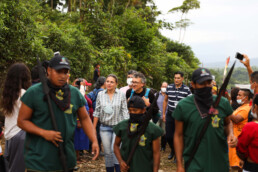
As detailed in a communication published yesterday by Ecuador’s Indigenous Movement, the case concerns first, “the right for Indigenous peoples in Ecuador to decide what happens in our territories, that is to say our essential right to self-determination and Free, Prior and Informed Consent, recognized internationally but not yet recognized, respected or applied in Ecuador.” And second, “the Rights of Nature, that is to say, the right of rivers, forests, mountains, and animals to exist without threats, contamination or destruction.” With 70% of the Ecuadorian Amazon in Indigenous hands and a new conservative ex-banker President promising to double oil production and rapidly expand mining in the Amazon, this ruling could be a game-changer.
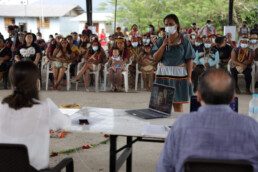
The high-stakes hearing took place in the A’i Kofan community of Sinangoe, whose 2018 lower-court victory canceled 52 gold-mining concessions along one of the country’s most important Amazonian headwaters. The A’i Kofán, a legendary Indigenous group known for their healing powers, river navigation skills, and stewardship of one of the most bio-diverse ecosystems in Ecuador, hosted hundreds of Indigenous leaders, elders and youth from across the country with a clear message: “Our territory is the base of our very existence and as ancestral peoples we have the right to decide over our future and our territories.”
Their territory is 63,775 hectares of primary forest, where jaguars, spectacled bears, and tapirs live. “Our spirits and the ‘invisible people’ live there too, it is where our identity as a People resides and only there is it possible to live, think and be A’i Kofán.”
Five of the nine judges of the Court crossed the Aguarico River and participated in a traditional harmonization ceremony before connecting to satellite internet and initiating the official hearing. From the Ecuadorian state, the Ministry of Energy and Mining was present in Sinangoe to defend the extraction of metals and petroleum in Indigenous territories to promote “the wealth and progress of everyone.” Other Ministries, like the Ministry of the Environment, Water and Ecological Transition, participated in the hearing online.
Wider Gauramag, Coordinator of the Indigenous guardia of Sinangoe pictured above in coordination with the Court’s police escort, explained to the judges that “as ancestral peoples of these territories, as millenary peoples, we have the right to be consulted but also that our consent is the ultimate objective of that consultation. If we say yes, that’s how it will be, if we say no, then that means no. We defend life, we defend our territory.”
Children from the community handed in drawings and hand-written letters to the judges as evidence.
Tayra Narvaez, a 12 year-old A’i Kofán girl, told the judges, “I want you to listen to us because as children this territory gives us everything and we are happy. We need you to take care of our territory, so we can live without mining and without contamination.”
Nemonte Nenquimo, who represents the Waorani of Pastaza and whose historic court case will also be heard by the Supreme Court shortly, said to the judges:
“You have a great opportunity as judges. We want our right to say yes or no to extractive projects to be respected. What has happened up until now has only led to deceit, division and destruction. As women, we demand that our rights are respected. We will be at the frontlines of this fight because we know that a great threat to our territories is on the horizon.”
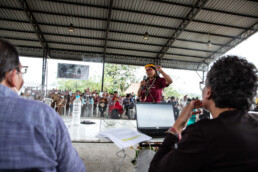
Nemonte Nenquimo, who represents the Waorani of Pastaza and whose historic court case will also be heard by the Supreme Court shortly, said to the judges:
“You have a great opportunity as judges. We want our right to say yes or no to extractive projects to be respected. What has happened up until now has only led to deceit, division and destruction. As women, we demand that our rights are respected. We will be at the frontlines of this fight because we know that a great threat to our territories is on the horizon.”
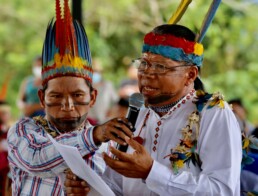
Jose Gualinga, ex-President of the Kichwa of Sarayaku explained to the judges that:
“mining in our sacred territories is like mining in the ancient ruins of Rome or the Notre Dame in Paris.”
Jose Gualinga, ex-President of the Kichwa of Sarayaku explained to the judges that:
“mining in our sacred territories is like mining in the ancient ruins of Rome or the Notre Dame in Paris.”
Wiña Omaka, a Waorani elder, was joined by other women as she sang to the judges:
“Our land is everything. For us and for you. There we have everything. Fish, animals, medicine. You eat from the market in the city, we eat from the forest.”
She added:
“When we say ‘no’ that means no. I am the authority of my territory, as you are the authorities in the city.”
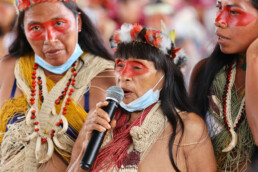
Wiña Omaka, a Waorani elder, was joined by other women as she sang to the judges:
“Our land is everything. For us and for you. There we have everything. Fish, animals, medicine. You eat from the market in the city, we eat from the forest.”
She added:
“When we say ‘no’ that means no. I am the authority of my territory, as you are the authorities in the city.”
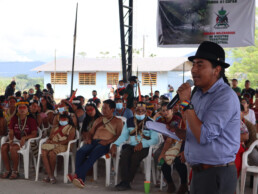
Leonidas Iza, President of the national Indigenous federation CONAIE, stressed the need to guarantee the right to free, prior and informed consent in order for Indigenous peoples to exercise self-determination and other fundamental rights guaranteed in the Constitution.
Leonidas Iza, President of the national Indigenous federation CONAIE, stressed the need to guarantee the right to free, prior and informed consent in order for Indigenous peoples to exercise self-determination and other fundamental rights guaranteed in the Constitution.
Justino Piaguaje said:
“My Nation, the Siekopai, have only 600 people left here in Ecuador. We want to continue to exist, and not fall into extinction like so many other Indigenous cultures in history.
We must have the right to decide our future and we must guarantee the Rights of Nature. Because it’s not just my people that face extinction: the world is facing profound climate change, and a point-of-no-return.”
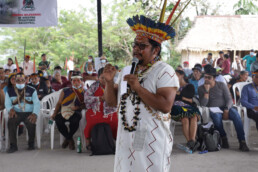
Justino Piaguaje said:
“My Nation, the Siekopai, have only 600 people left here in Ecuador. We want to continue to exist, and not fall into extinction like so many other Indigenous cultures in history.
We must have the right to decide our future and we must guarantee the Rights of Nature. Because it’s not just my people that face extinction: the world is facing profound climate change, and a point-of-no-return.”
Ecuador became the first country to enshrine the Rights of Nature into its Constitution in 2008, giving citizens the possibility to sue on behalf of trees, rivers or animals. This case presents an opportunity for the Constitutional Court to recognize, among other things, how the rights of a fragile river ecosystem trump government plans for mining or oil that could destroy that river.
Sinangoe’s lawyer Maria Espinosa of Amazon Frontlines, argued to the Court that the government’s history of systematic rights violations show that “the current practice of consulting Indigenous communities before extractive projects but not recognizing their right to say “no” violates their right to self-determination” and puts many at risk of physical and cultural extermination.
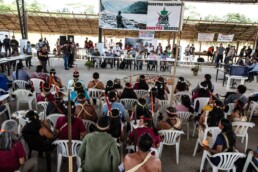
As Sinangoe and Ecuador’s Indigenous Movement’s published statement yesterday says, “The resolution of this case by the Constitutional Court is urgent and extremely important for the moment that Ecuador, and the planet, currently finds itself in.
The hearing took place days after world leaders signed agreements to face climate change and stop deforestation at COP26 in Glasgow, and months after the President of Ecuador Guillermo Lasso promised to double oil extraction and rapidly expand mining in the Amazon, through Presidential Decrees 95 and 151 (which was recently challenged by Indigenous peoples in Court).”
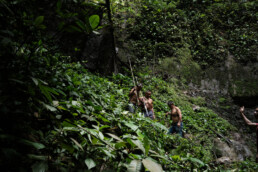
Indigenous peoples take care of 70% of the Ecuadorian Amazon, almost 7 million hectares of the most important rainforest on the planet. Deforestation of just one hectare of our territories represents the equivalent carbon emissions of 160 cars for a whole year.
It is not possible to face climate change without the Amazon, and it is not possible to protect the Amazon without us, Indigenous peoples, and without guaranteeing our rights
When the judges cut the hearing short, Indigenous leaders took immediate action, installing a General Assembly on-site to continue listening to testimonies. The Assembly resolved to maintain in constant vigilance until the Court publishes a ruling and called on the national government to freeze all future concessions or licences for extractive industries until the Court rules.
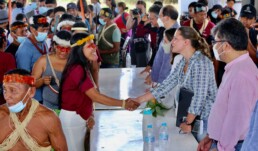
The Court should publish a ruling within the next few months that will set national precedent. The ruling will also set obligatory precedent for Ecuador’s Congress which must elaborate a law that regulates the right to free, prior and informed consent nationally.
The judges of the Constitutional Court have the heavy responsibility to make a decision regarding our rights. This is about life and death, about our future or our extinction.
The Court should publish a ruling within the next few months that will set national precedent. The ruling will also set obligatory precedent for Ecuador’s Congress which must elaborate a law that regulates the right to free, prior and informed consent nationally.
The judges of the Constitutional Court have the heavy responsibility to make a decision regarding our rights. This is about life and death, about our future or our extinction.
Making the Glasgow Declaration work for people and forests: 3 steps for success
World leaders made headlines in Glasgow last week with new commitments to halt deforestation and invest resources in frontline Indigenous communities. Any and all hope of reaching the Paris climate goals and averting worst-case climate scenarios require safeguarding forest landscapes, but a track record of high profile pledges languishing unimplemented has given good reason for skepticism. In 2014, world leaders made similar commitments in the New York Declaration on Forests, pledging to halve deforestation by 2020. Since that time, deforestation has continued apace, and parts of the vitally important Amazon rainforest have now made the long dreaded shift from carbon sinks to sources of emissions of themselves. With the looming threat of the Amazon near the tipping point of switching from rainforest to savannah, the stakes have only increased.
At the very least, these recent commitments signal a growing understanding that the status quo is not sufficient, that greater action, political resolve and resources are needed. But it does beg the question of what is different now, and what lessons have been learned in recent years that will give the Glasgow Declaration hope of a different, more successful fate. The Glasgow declaration was underpinned by commitments to channel $19 billion in public and private funds towards protecting forests, of which $1.7 billion USD is dedicated for Indigenous peoples and local communities. That is welcome and needed news, but to make real change, financial commitments need to translate into new resources that reach actionable investments in solutions. High-level financial commitments at the climate talks have tended to get mired in bureaucratic obstacles, double-counting and fail to reach those who can deliver results. It’s not yet clear how these commitments will reach communities who need resources nor how resources committed will shift policies that have relied on forest destruction.
As much as past failures invite skepticism, the stakes have simply become too high to abandon hope. Tropical forests now teeter on the precipice of a dangerous and irrevocable tipping point. Indigenous peoples have been on the frontlines, often laboring in obscurity, without the support they need to make change at the scale they are capable of delivering. As the climate talks wind down, and we get to the hard work of making good on promises made, here are three concrete, immediate steps that can be taken to make the Glasgow Declaration a success where others have failed.
1. Secure Land Tenure for Indigenous Peoples: A Scalable Solution with Immediate Results
Land rights for Indigenous peoples offers a cost effective, immediately scalable solution, and big investments are capable of delivering big results quickly. The data is clear, and it has been for some time: when the rights of Indigenous Peoples are recognized and secured, rates of deforestation are lower and carbon stocks are higher than in forests managed by others. The world over, Indigenous movements have called for greater investment in efforts to secure formal title to their lands. While new commitments have been made over the last decade, resources have been slow to reach communities who are engaged in often protracted battles with their governments to seek title, even as “bulldozers are at the gate.” That has to change and it has to change quickly.
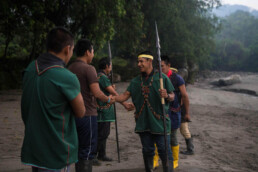
In Ecuador, the Indigenous movement is poised to secure massive gains in some of the most carbon rich and biodiverse forests in the world. Over the last 50 years, the government of Ecuador has unilaterally declared at least 1.4 million hectares of ancestral Indigenous lands as national parks, granting sole ownership to the government. Indigenous peoples who live in these areas are forced to negotiate weak, temporary land-use agreements with the government to access their territories. Even worse, these agreements do not prevent state interests from granting lands to either oil and mining companies, demonstrated most recently by the approval of oil drilling within the Yasuni National Park, which overlaps ancestral Waorani territory. Formal recognition of Indigenous peoples land title will provide a critical and additional layer of protection for the forests and carbon stored in these lands.
2. Secure Rights for Indigenous Peoples: An Immediate Opportunity for Durable Reform
Indigenous peoples have not waited for top-down political commitments to continue their struggle to protect their lands and safeguard the climate. Over the last several years, Indigenous peoples have created an unprecedented window of opportunity to make dramatic and long-lasting changes to policy frameworks that privilege natural resource extraction over Indigenous guardianship and climate protection. Resources pledged to implement the Glasgow Declaration must support these urgent struggles in the near term.
The Ecuadorian Constitutional Court is poised to create unprecedented new jurisprudence on Indigenous peoples’ right to decide what happens on their lands and territories. In early 2020, the new progressive-leaning Constitutional Court of Ecuador selected the Sinangoe and Waorani court rulings (both brought with legal support from Amazon Frontlines) for review out of thousands of cases, setting up the country’s first real opportunity for national jurisprudence on indigenous rights to Free, Prior and Informed Consent (FPIC), and the Rights of Nature as applied in Indigenous territories. The outcome will determine whether these constitutional rights exist only on paper or are actually applicable in practice.
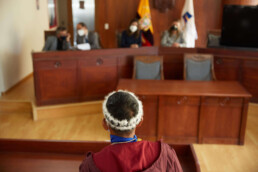
Free, Prior and Informed Consent (FPIC) is a vital tool for communities to resist planned extraction on their lands. The rights of indigenous peoples are widely recognized constitutionally and internationally. However, the effective implementation of international legal norms and Constitutional obligations is precarious, as governments continue to promote laws and policies that promote an economic development model based on mining, oil, hydroelectric energy and forestry exploitation. While many indigenous communities enjoy some form of recognition of collective tenure to their lands, the Government of Ecuador retains subsurface rights and continues to grant concession allocations to commercial actors on indigenous-held lands for extraction in violation of their fundamental right to free, prior and informed consent. Increasing protections for Indigenous peoples’ rights to control their lands could safeguard over 7 million hectares of intact rainforest in Ecuador.
3. Changing Course on Extractivist National Policy in COVID Recovery Plans: Lessons for the Future
The success of the Glasgow Declaration hinges on whether it successfully catalyzes much needed course corrections away from national development policies premised on “extraction at all costs”. Many countries are facing not only persistent sustainable development challenges, but are now also facing added economic crises arising from the current global health pandemic. The Glasgow Declaration comes at a critical time when many countries are seeking innovative ways to rebound from the COVID health and economic crises. The signatories to the Glasgow declaration, which covers over 90% of global forest area, have committed to “ensuring robust policies and systems are in place to accelerate the transition to an economy that is resilient and advances forest, sustainable land use, biodiversity and climate goals.” That means that forest countries must re-evaluate existing policy frameworks that do not align with those goals, and certainly means that signatory countries should not pursue new policies that run counter them.
Just months prior to signing this declaration, President Lasso in Ecuador issued Executive Decrees to massively expand new oil and mining extraction, threatening millions of hectares of pristine rainforest and the physical and cultural survival of Indigenous nations. The decrees are part of the new Presidential administration’s public policy strategy to address the country’s crippled economy and its colossal foreign debt by doubling down on extractivism and the exploitation of nature. If implemented, Executive Decrees 95 and 151 will radically transform the government’s policies on oil and mining to favor industry and attract foreign investment.
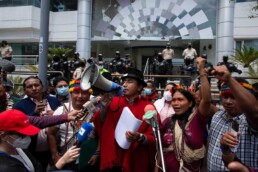
On October 18th, 2021, hundreds of Indigenous elders, youth, and leaders arrived in the capital city of Quito, having journeyed from their communities deep in the Amazon rainforest, to challenge Executive Decree 95, which seeks to double the country’s oil production to one million barrels per day by deregulating the operational processes in the oil and gas industry. The decree will profoundly affect Indigenous rainforest territory, as almost all oil reserves are in the Amazon, and almost all untapped reserves are within Indigenous territories. The lawsuit, brought with the legal support of Amazon Frontlines, challenges what is a clear first step towards a Bolsonaro style plundering of the Ecuadorian Amazon. Additional suits against Executive Decree 151, which aims to relax environmental controls to fast-track the entrance of foreign mining companies in the Amazon, are anticipated in the coming weeks.
Leaders have an important window of opportunity to capitalize on political momentum for reform arising from these pledges to ensure that while the longer process of policy reform is initiated, new harmful policies are scrapped before they lock in untold damage to forests and people. The vast majority of mining projects are at auction or exploration stage, not production stage, and many new oil concessions have not been auctioned or broken ground yet due to indigenous resistance. World leaders should come together to review these policies and change course, or risk the same fate of earlier failed declarations.
Our Territories, Our Decision
This editorial was originally published in El Comercio, the most widespread newspaper in Ecuador, by the Waorani leader, Nemonte Nenquimo, and the leader A’i Cofán, Alexandra Narváez.
Over five hundred years ago, the conquistadores invaded Indigenous territories throughout the Americas on their horses, carrying swords, rifles, and a document – they called it the “Requirement”. They read this document to us in Spanish – a language that Indigenous peoples did not understand. The document essentially said: “From now on, let it be known that we are your owners. If you submit to this, then you can live in peace with us, and if not, we are going to wage war against you”. It was a violent document. But that ink on paper satisfied the formalist and bureaucratic needs of the conquerors and in turn, justified the cruel history of conquest that our world knows only too well.
We are two Indigenous women leaders from communities of the Waorani and Kofan nations in the Ecuadorian Amazon. As we write this, we want to tell you that this story of conquest continues today. In Ecuador, the government and companies continue to set new traps to push forward new conquests, like oil and mining extraction. They use formal procedures, which are not so different from the infamous 1513 Spanish Requirement.
In other words, what the Ecuadorian governments and industries call “free, prior and informed consultation” is nothing more than the following: they give us confusing and misleading information about what they want to do in our territories, and if we do not agree, they threaten us by waging war against us again.
The world has heard about our struggles and our victories. In 2018, the Indigenous guardia of the Kofan community of Sinangoe discovered large machinery excavating the shores of one of the country’s most important Amazonian headwaters, the Aguarico River, during a land patrol. It was one of the fifty-two mining concessions granted by the Ecuadorian government for a duration of twenty-five years, without any consultation whatsoever with the community. Although this river is a source of life for us, the State argued that it didn’t need to consult us before granting the concessions. Can you believe the nerve? But later that year, the Provincial court of Sucumbios ruled in favor of our rights, affirming that we, the Kofan, are the ancestral guardians of this territory, and so we must be consulted.
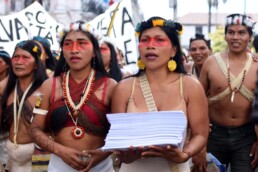
In 2012, government officials traveled to Waorani territory and to the territories of six other Indigenous nations in the central-south Amazon. They came by plane and arrived unannounced, offering us Coca-Cola and bread, and gave quick and impossible to understand presentations about an oil block auction. They tried to lure us in by promising to build schools and football fields. One hour later, they took off into the air again and claimed to have completed their formality of “consultation” – in other words, their justification for the new extractivist conquest. It didn’t matter if we agreed or not: the government had decided that the oil auction was going forward. Or so they thought! But we, the Waorani, have always fiercely defended our territory since time immemorial. In July 2019, we danced and sung as we celebrated our historic legal victory against the Ecuadorian government in the Provincial Court of Pastaza, which recognized that our right to self-determination and free, prior and informed consultation had been violated. The ruling put a halt to the planned expansion of sixteen new oil blocks overlapping one million hectares of Indigenous rainforest territories.
Our ancestors used to fight carrying spears on their shoulders. Today, we are fighting with documents written in Montecristi (birthplace of the current Ecuadorian Constitution) and Geneva in our hand, documents that recognize our right to free, prior, and informed consent and self-determination.
Now our cases sit before the Constitutional Court of Ecuador, which has a historic opportunity to make it clear that the government, oil companies, miners and loggers cannot impose their projects in our territories without our consent. Our rights, our territories, our decision!
But we cannot carry on waiting. Too much is at stake. The very future of the Amazon and our climate is at risk. The Constitutional Court must convoke a public hearing on the case now. The Court must rule on Indigenous people’s right to decide in Ecuador and guarantee that our right to decide over the future of our territories and cultures is respected. It is a necessary step for this pluri-national country and a clear sign that we have left the conquest in the past. This is our “Requirement.”
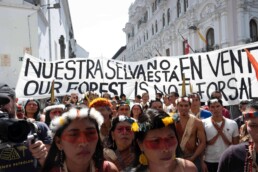
“Our Forest Is Our Life": Indigenous Peoples from Ecuadorian Amazon Defend Historic Victories For Indigenous Rights & Amazon Protection
After a long journey from the Amazon traveling by foot, by canoe and by road, hundreds of indigenous peoples arrived in Ecuador’s capital city last week to mobilize in support of the Waorani and Kofan nations, whose historic victories against oil and mining interests have inspired hundreds of indigenous communities across the Amazon in their resistance against extractivism.
United with other indigenous nations from the Ecuadorian Amazon including the Kichwa, Sapara, Shiwiar, Shuar, Siekopai, and Siona, who face similar rights violations and threats in their territories, indigenous youth and elders took to the streets of Quito in song and dance and staged powerful mobilizations outside several State institutions to denounce the government’s ongoing complicity in Amazon destruction and its failure to comply with their court rulings. The Waorani and Kofan notably met with Ecuador’s Supreme Court, which has accepted the Kofan of Sinangoe’s case for review – an important feat for indigenous peoples in Ecuador, which could also mark the country’s first ever Supreme Court ruling on prior consultation and the right to self-determination as applied to indigenous peoples.
The Waorani and Kofan know the stakes are high, and that their victories present invaluable opportunities to advance the law and indigenous rights not only in Ecuador, but across the region. Yet despite their important triumphs against big oil and mining and the recognition of the importance of their cases by Ecuador’s Supreme Court and the United Nations, the government’s extractive agenda continues full throttle. Recent announcements reveal plans to expand oil and mining concessions in the Amazon in order to repay the country’s crushing debt to China, imperiling our world’s most important forest, indigenous territories, and our planet’s climate.
In 2018 and 2019, the Kofan and Waorani won unprecedented legal battles against the Ecuadorian government, protecting hundreds of thousands of pristine megabiodiverse rainforest, and setting invaluable legal precedents for indigenous rights in the country and the Amazon region. In the months ahead, the Waorani and Kofan will continue to ramp up the pressure to ensure that the Ecuadorian government respects indigenous rights and territories.
“We are the voice of the forest. We demand that the government listen to us and respect us. We continue to resist. Our legal victories are important because they define our future as indigenous peoples; they are an important tool to guarantee our rights and our physical and cultural survival in our territories”
Young Kofan leader Alex Lucitante delivers a powerful message outside Ecuador’s Supreme Court during a press conference. The Ecuadorian Supreme Court, in November of 2019, selected the Kofan community of Sinangoe’s ruling for review in order to turn their victory into national jurisprudence for indigenous peoples across the country.
“Our territory is our home and we will not allow the State to destroy our territories and our existence. Our fight is not just for us as Waorani people. We are united in the same struggle with our brothers and sisters from other indigenous nations, such as the Shuar, the Schiwiar, the Sapara. We are fighting for our life and for the future generations. The government must listen to us and respect our decisions. We will continue to resist and unite!”
Waorani leader Nemonte Nenquimo, who was lead plaintiff for her people’s legal victory last year protecting half a million acres of their rainforest territory from oil drilling, speaks out during a press conference outside Ecuador’s Supreme Court.
Amazon Frontlines Lawyer Maria Espinoza speaks out during a press conference outside Ecuador’s Supreme Court: “These communities’ rights have been violated and their lives have been affected. The Supreme Court now has a historic opportunity in its hands, not only to review both Waorani and Kofan cases, but also to make a clear declaration on the right to free, prior and informed consent, a right which protects indigenous peoples from extinction”
“As Waorani elders, we have come to demand respect for our right to life. Our territories are not for sale”
– Omanca Enquiri, Waorani leader and elder (also known as a “Pekinani” in the Waorani people’s language). The Waorani people hope that their case will be selected, alongside the Kofan people’s case, to ensure that indigenous people’s rights to prior consultation and self-determination are guaranteed in accordance with the Ecuadorian Constitution and international law.
“This is not the first time we have come here. Our court ruling is not being complied with. Our lives are at risk. The Ministry of the Environment is not taking actions to protect or monitor our territory and mining continues to threaten our existence”
Kofan leader and President of the Sinangoe community, Edison Lucitante, speaks out to Ecuador’s Vice-Minister of the Environment inside their headquarters in Quito.
United Nations Pays Tribute to Waorani People’s Victory on Indigenous Peoples Day
United Nations Pays Tribute to Waorani People’s Victory on Indigenous Peoples Day
Today, on #IndigenousPeoplesDay, the United Nations released a special video paying tribute to the inspiring struggles of the Waorani people, and all indigenous nations, in the battle to protect their lands, their way of life, and our shared climate from the mounting threats of a global economic system premised on the limitless extraction of natural resources.
“The Waorani people have defended their land for generations. They won a legal battle but their struggle isn’t over. On #IndigenousPeoplesDay, they ask us to unite and fight.” – Message from the United Nations.
In the tribute video, Nemonte Nenquimo, Waorani leaders, says: “We want to give a message to the world. We need to unite in the struggle because the fight is not only up to indigenous people but for all of humanity. We have to sustain our planet. Everyone is talking about climate change. That is what we have to do: Unite to save our planet.”
The Secoya, Siona, Kofán and Waorani indigenous nations featured in the video have lived for half a century with the impacts of oil. They have united to form an alliance, the first of its kind in their history, to protect their lands and way of life. This union has been instrumental in saving half a million acres of the Waorani’s land from oil drilling. In the words of a young Kofán leader, “We have united with our Waorani brothers and sisters because we share the same struggle and dream: to protect our forest and to continue being who we are, as indigenous peoples.” Check out this Chronicle to learn more about how this alliance worked together to defend the Waorani’s forest.
Nemonte is right. Only through unity can we overcome problems as big as the destruction of the Amazon and our planetary climate crisis. Join the indigenous nations in defense of indigenous life and one of our planet’s greatest natural treasures.
8 Reasons The Landmark Ruling In Ecuador Signals Hope In The Struggle To Save Amazon Rainforest
This summer, a court in Ecuador issued a ruling with profound implications for the urgent fight to save the imperiled Amazon rainforest. The decision effectively blocked a planned government oil-auction that threatened half-a-million acres of some of the world’s most biodiverse primary rainforest. The broad outlines of the situation are sadly familiar to similar cases found throughout the Amazon region: In pursuit of foreign investment, the government sought to partner with foreign firms to develop large swaths of ecologically fragile rainforest. As is often the case, these forests were the ancestral lands of indigenous inhabitants who were not informed about — and did not approve — the arrival of industry on their territory.
The Waorani villagers-turned-plaintiffs have millennia deep roots in the region. They have seen the effects of oil blocks in other parts of the Ecuadorian Amazon, and knew that the planned auction threatened their survival and way of life. They also knew their rights: Like all indigenous peoples, they hold an internationally recognized right to informed consent when it comes to the “development” of their ancestral lands. When indigenous people fight to defend and enforce these rights, they are protecting their future and ours. The fate of the global climate hinges on empowering the indigenous peoples who help preserve nearly a quarter of the Amazon across seven nations, and who represent a powerful buffer against the destruction of a biosphere that regulates our planet’s flows of oxygen, carbon and freshwater.
Below are eight important lessons of this historic victory.
1) Healthy Cultures, Healthy Forests
The Waorani people are legendary hunter-harvesters of the southcentral Ecuadorian Amazon. For unknown centuries before their contact by missionaries in the 1960s, they lived in harmony with and preserved their rainforest home. They developed a rich culture marked by high craftsmanship and artistry, profound spirituality and a sophisticated understanding of the natural world and its complex systems of plant and animal life.
The Waorani and hundreds of other Amazonian indigenous cultures have been under enormous strain since the arrival of industry in the last century. Indeed, it is impossible to separate the physical pollution of the rainforest from the cultural disruption experienced by the people who live there. The relation between them is not causal, but cyclical: The growth of oil roads, mono-crops and mining jeopardizes indigenous peoples’ ability to survive off the land sustainably and in balance with the forest. It creates a dynamic that forces indigenous youth to abandon tradition and find work in the very industries that threaten their forest homes. The Waorani victory is important not only because it protects trees, but because it protects the culture that can continue to protect trees for centuries to come.
2) Defining the Narrative: Maps, Technology, Stories
The fate of the rainforest will be determined by how the world chooses to see it and conceive of its riches. Is the Amazon basin merely a green mass of undifferentiated land, crisscrossed by hundreds of unremarkable rivers? Is it a grid of resource concessions, notable for what’s under the ground, and convertible into currencies and value on international commodity markets? Or is the Amazon a tapestry of delicate and overlapping systems containing immeasurable biological, ecological and cultural treasures?
At their most basic level, these are competing stories, conflicting narratives, that begin with the maps that we use to represent the land. One of the ways the Waorani “won the narrative” was by using their own maps and telling their own stories. A territorial mapping project showed what the state and company maps left out — the turtle nesting grounds, the sacred sites, the ways the rivers fed the forest and each other. Through this and other tools — drone videos, testimonies, camera-trap images, even selfies — they illustrated the many ways that their culture, and everything it protected, is more precious than oil and greed. They also showed how a hunter-harvester people can leverage technology and social media on their own terms to challenge a mighty industry and capture the imagination of global civil society.
3) The Power of Legal Precedent
Rights enshrined in international laws and national constitutions are not worth their ink without enforcement. As with any laws, they are more likely to be enforced when they rest on firm precedent, locally and around the world. For too many years, the Waorani have seen the Ecuadorean government ignore their constitutional and international obligations to inform and acquire consent, and allow companies to pollute indigenous lands.
“We are Waorani and we have always lived in the Amazon rainforest. For thousands of years we have defended our territory from trespassers. Now we are fighting with our words and papers. We never knew the government wanted to extract oil from our lands. We, Pikenanis, are never going to sell our territory to the oil companies. We want to live well in our territory.”
– Memo Yahuiga Ahua Api, Pekinani (traditional leader)
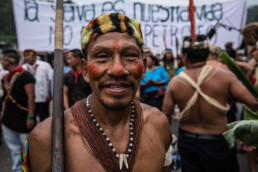
“We are Waorani and we have always lived in the Amazon rainforest. For thousands of years we have defended our territory from trespassers. Now we are fighting with our words and papers. We never knew the government wanted to extract oil from our lands. We, Pikenanis, are never going to sell our territory to the oil companies. We want to live well in our territory.”
– Memo Yahuiga Ahua Api, Pekinani (traditional leader)
Because the Waorani demanded the government respect the law and the constitution, indigenous peoples across the Amazon can now draw inspiration and tactical lessons from Waorani legal success in linking the right to self-determination to the right to free, prior, and informed consultation. Its example puts the country and the region one step further towards redefining the legal framework for indigenous rights.
Although the first battle has been won, the struggle is ongoing. The Ecuadorian government is still seeking to auction seven million acres in the country’s central rainforest to oil companies.
4) Climate Change & Interconnectedness
The Waorani victory is a victory for the climate: it keeps 500,000 acres of trees working as carbon vacuums, and prevents the pumping of millions of gallons of crude oil that would have been shipped to California for refining and distribution to gas stations across the United States. In aggregate, it is estimated that over the next ten years the Waorani victory will have avoided approximately 19.0 million metric tons of CO₂ emissions – or the equivalent of the greenhouse gases emitted from roughly 4 million passenger cars in one year.
After the oceans, the rainforests are the world’s most important carbon sinks, a sprawling continent’s worth of vegetation that absorbs and keeps carbon out of the atmosphere for hundreds of years. As the traditional inhabitants and defenders of this carbon sink, indigenous communities are the “secret weapon” in its defense, according to a growing body of research. A report by a group of leading research centers estimates that indigenous lands cover around a quarter of the world’s above-ground tropical carbon sinks.
The importance of the Amazon system extends beyond carbon. Its hydrological cycle involves more than one-fifth of the planet’s freshwater supply, and any decline in rainfall and evapotranspiration in the Amazon — the consequence of deforestation and contamination — has far-reaching effects, including drought in breadbaskets throughout the hemisphere and less river-feeding snowpack in the mountains of the pacific northwest.
5) Women in Front
The Waorani struggle involved three generations of women fighting to protect their culture, territories and sources of food and fresh water. Dozens of Waorani women participated in the court proceedings, and led the media events surrounding the hearing. They arrived bearing examples of traditional Waorani culture and craftsmanship — palm-woven baskets, clay pots and food grown in traditional gardens. When the women felt they were being disrespected by court and government officials, they halted the insults by breaking out into spontaneous song. All of this helped capture the imagination of the world with their spirit and their conviction and courage.
“This victory is a dream come true. It means that our future generations can continue to live freely in a healthy and pristine forest, with clean water and pure air. I always wanted to protect these lands for the future generations, as my ancestors did for me! It is the legacy for my grandchildren. This belongs to them!”
– Omanca Enquiri, Pekinani (traditional leader)
One of the lead plaintiffs in the case is Nemonte Nenquimo, a Waorani mother and president of the Waorani communities on the Pastaza river. “We are the caretakers of the forest and we will continue defending it as our ancestors have done for thousands of years,” Nenquimo told reporters outside the courtroom during this summer’s hearing. “As women, we are fighting for our children, for our families, for our communities and for our Mother Earth. We will never allow the oil companies to enter our territory. Our forest is not for sale and this is our decision”.
6) Protecting Rivers and Water
Life in the Amazon is lived on rivers. From fishing to bathing to providing drinking water, the rivers are the central arteries of everyday life. Because all of the rivers in the Amazon flow from or into other rivers — and are often located in floodplains — it is all but impossible to isolate or contain contamination. This is made tragically clear in the legacy of the U.S. oil company Texaco (now Chevron) which in the 1960s won a government contract to develop the region’s oil deposits. Disregarding the health of the forests and the local indigenous people, the company dumped waste and spilled oil wantonly throughout the forest and into its rivers. Many local indigenous people fell ill and died from consuming toxic material that sometimes appeared as thick sludge on the river, and other times was invisible, but no less dangerous to those who consumed it through the water, produce grown on contaminated soils, and the wider food chain. Today, many communities in eastern Ecuador cannot drink from rivers their ancestors used for countless generations. The contamination of the region is not historical, but ongoing. Though Chevron no longer operates in the region, regional and Chinese firms continue to engage in oil production at the invitation of the Ecuadorean government.
This is the crucial, local context for the Waorani victory, and explains why the villagers refused to allow further destruction of the area’s fresh water sources. Their refusal reflects a global movement — seen throughout Latin America, Africa, and Asia, all the way to Standing Rock in the U.S. — to both defend indigenous rights and lead by example toward a broader and deeper respect for nature as the sacred source of all life.
7) Wildlife and Biodiversity
It is said that the Amazon invites cliché and resists hyperbole. Indeed, it is difficult to overstate the bounty of the Amazon’s plant and animal life. Accounting for a tenth of all known species on the planet, the Amazon is an ecosystem without equal. It is also an ecosystem full of mysteries yet to be discovered. Much of the modern pharmacopeia derives from Amazonian plants, and longstanding medical mysteries may yet be solved by researching the flora of a healthy forest.
“The forest is rich and provides us with everything we need.
We are not poor, we are rich in resources and we will not allow anyone
to come and destroy our home because it is our life”
– Awane Ahua, Pekinani (traditional leader)
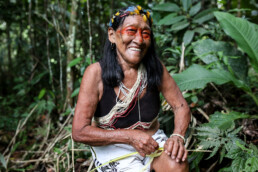
“The forest is rich and provides us with everything we need.We are not poor, we are rich in resources and we will not allow anyone to come and destroy our home because it is our life”
– Awane Ahua, Pekinani (traditional leader)
The northern Ecuadorian Amazon is a tragic example of how the delicate web of life in the rainforest can be ruined within a generation by the arrival of extractive industry. In 1970, the area around Lago Agrio, the region’s biggest city, was one of healthy rivers and forests, full of animal and aquatic life. Now, in villages along the Putamayo and Aguarico, the water is undrinkable and many ancestral hunting grounds are bare, polluted, and bisected by roads. Fragmentation is a major threat to biodversity and wildlife, and the government’s proposed oil blocks would pollute an important biological corridor running across the wider region.
The species-level stakes of Amazon protection were highlighted this May with the release of a landmark United Nations’ report on biodiversity. The report warned that unless critical ecosystems are protected, as many as one million species are threatened with near-term extinction. The Waorani have won a battle for themselves, their children and the planet, but also for the jaguars, the monkeys, the birds, and the ants.
8) Union of Indigenous Nations
The indigenous nations of the Ecuadorian Amazon understand themselves to share a common struggle. Collectively they are the guardians of 70% of the entire Ecuadorian Amazon rainforest. Many of these peoples joined the Waorani in solidarity outside the courtroom, traveling from distant communities in the country’s north and south. They marched with the Waorani in the streets; they submitted amicus briefs; and they returned to their communities to share what they had learned to better organize for the future. “We have united with our Waorani brothers and sisters because we share the same struggle and dream: to protect our forest and to continue being who we are, as indigenous peoples,” said Alex Lucitante, a Kofan leader. “We will continue to unite forces and build strength between our peoples to resist the threats to our territories. Without unity, there can be no triumph.”
"Indigenous Nations across the Amazon and the world must band together to protect our homes."
- Oswando Nenquimo
This model of multi-nation mobilization and solidarity — across Ecuador and the entire Amazon — will be crucial to defeating the extraction at-all-costs paradigm that threatens the region. The Waorani alliance was a powerful demonstration of this. Now the challenge is to scale up the precedent and further empower those defending the seven million acres of indigenous land still targeted by the government and the oil industry.
Will you stand with the Amazon’s oldest guardians to protect a forest we all depend upon at this critical moment?
Waorani People Win Historic Appeal Against Ecuadorian Government
Puyo, Ecuador, July 11th, 2019 – After a hard-fought appeal, the Waorani people of Pastaza won a historic and final appellate ruling in Ecuadorian court protecting half a million acres of their territory in the Amazon rainforest from being earmarked for oil drilling. The decision by the three-judge panel of the Pastaza Provincial Court permanently voids the consultation process with the Waorani undertaken by the Ecuadorian government in 2012, indefinitely suspending the auctioning of their lands to oil companies. The now final verdict also jeopardizes the contemplated auctioning of 16 oil blocks that cover over 7 million acres of indigenous territory by providing an invaluable legal precedent for other indigenous nations across the Ecuadorian Amazon.
“This victory is for my ancestors. It’s for our forest and future generations. And it’s for the whole world.” said Nemonte Nenquimo, President of the Waorani Pastaza Organization (CONCONAWEP) and plaintiff in the lawsuit. “We have shown that life is more important than oil and that united we can protect our way of life, the Amazon rainforest, and our planet from destruction.”
After a contentious appellate hearing and public pressure by the Ministry of Energy and Non-renewable Resources and the Ministry of the Environment to reverse the lower-court’s ruling and permit the government’s oil auction to move forward in Waorani territory, the decision on appeals represents a major setback for the Ecuadorian Government, and marks a watershed moment in the indigenous movement to permanently protect their rainforest from oil drilling, and other extractive projects. The panel of judges ratified the ruling, forcing the Ecuadorian government to repeat the prior consultation process according to the standards of international law and the Constitutional Court of Ecuador in order to initiate any future oil activities. Additionally, the sentence orders the Ministry of Energy and Non-renewable Resources and the Ministry of the Environment to sufficiently train government officials regarding the right to free, prior and informed consultation and self-determination before sending them out into the field. The appellate court also expanded the ruling by demanding an investigation into the actions by government officials involved in the unlawful prior consultation process.
The Waorani people’s lawsuit has emerged as a flashpoint in the South American country, highlighting the stark gap between the Ecuadorian government’s thirst for oil revenues to relieve international debt and indigenous peoples’ internationally recognized rights to free, prior and informed consent, self-determination, collective territory and the rights of nature. Amidst the backdrop of decades of contamination and cultural disruption in indigenous territories across the Amazon by oil operations, the Waorani’s court ruling stands as a landmark victory for indigenous nations fighting to protect the last bastions of wild-standing forest.
“The appellate court’s verdict clearly confirms that the Waorani have the right to decide over their lives, their territory and their future,” said Lina Maria Espinosa, lawyer for the Waorani from Amazon Frontlines. “And it shows that the Ecuadorian government has been systematically violating that right for decades. This is a precedent for Ecuador and the world.”
Now attention turns to neighbouring indigenous nations whose 7 million acres of rainforest homelands are threatened by the same oil auction, and who as victims of the same flawed prior consultation process in 2012 will benefit immediately from the precedent set by the Waorani verdict. The appellate court ruling should effectively nullify the entire prior consultation process undertaken by the government in 2012 and block the planned auction of 16 oil blocks across the South-Central Ecuadorian Amazon, although the government has given no hints of abandoning the auction yet.
“Indigenous peoples collectively own nearly 70% of the Ecuadorian Amazon, but they also control more than a quarter of the entire Amazon basin,” said Mitch Anderson, Executive Director of Amazon Frontlines. “This battle goes beyond the courtroom, it’s a testament to the Waorani people’s knowledge of their forest, their way of life and their resilience in defending their homeland against all odds. Indigenous stewardship is the key to safeguarding the Amazon from destruction.”
Key to the victory was the Waorani’s global digital campaign to warn the Ecuadorian government that “Waorani territory is not for sale”, which has built a global movement of solidarity with the struggle, garnering more than 340,000 signatures and public support from international celebrities such as Leonardo DiCaprio and Mark Ruffalo. https://waoresist.amazonfrontlines.org
The Waorani’s lawsuit was co-filed by CONCONAWEP (Coordinating Council of the Waorani Nationality of Ecuador-Pastaza) and Ecuador’s Human Rights Ombudsmen.
For more information, interviews, or photo/video requests, please contact:
Sophie Pinchetti, Communications Coordinator
sophie@amazonfrontlines.org
+593 98 148 4873
